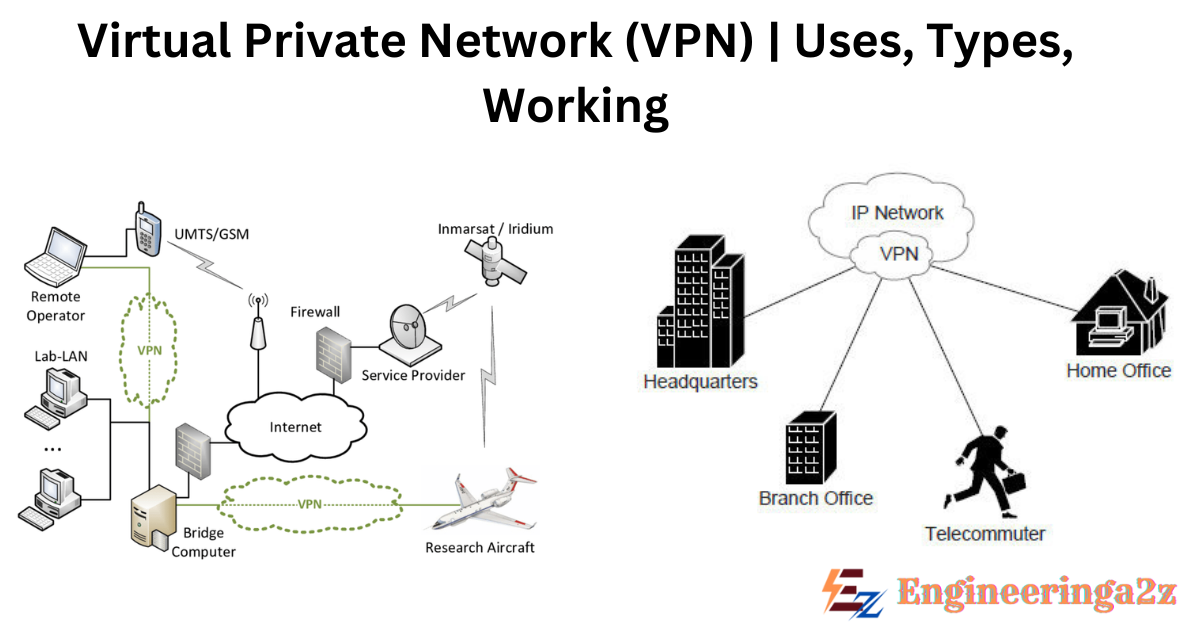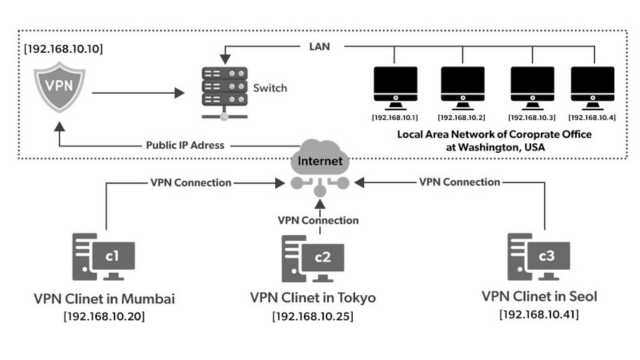
Table of Contents
Virtual Private Network
A Virtual Private Network (VPN), which illustrates virtual confidential organization, lays out a computerized association between your PC and a far-off server claimed by a VPN supplier, making a highlight point burrow that encodes your information, veils your IP address, and allows you to evade site blocks and firewalls on the web. This guarantees that your web-based encounters are private, safeguarded, and safer.
The VPN connections should be:
- Virtual VPN – A virtual network has no physical cables allowed during the connection process.
- Private VPN – Private connection so no one can see your data.
- Networked VPN – Multiple devices can use this.

VPN Types
There are wide range and variety of Virtual Private Networks available for different devices like computers, and mobile. Here are some most common types and widely used VPN types:
1. Remote Access VPN
- Remote Access VPN is used to connect to user to a private network and give access to all the services and resources remotely.
- The association between the client and the confidential organization happens through the Web and the association is secure and private.
- It is used for home.
2. Site-to-Site VPN
- A Site-to-Site VPN is likewise called a Switch-to-Switch VPN and is normally utilized in huge organizations.
- Site-to-site VPN is used by organizations or businesses that have branch offices in different locations to connect one office’s network to another office’s network.
3. Mobile VPN
- A portable VPN is a virtual confidential organization that permits versatile clients to interface with a confidential organization safely.
- It makes a solid and scrambled association between the cell phone and the VPN server.
- When a user is out of the office, they can use mobile VPNs to access corporate resources like email and internal websites.
- These arrangements are normally utilized by associations to get their versatile labor force.
Working of VPN
A virtual private network (VPN) alters a user’s actual location to that of the VPN. They can access content or websites that are typically restricted to that region thanks to this. For instance, a client in the U.S. can set their area to the Unified Realm and watch content from streaming sites focused on English crowds. A U.S. resident can likewise keep streaming their #1 shows in any event when they are away from the nation on vacation.
At the point when an endeavored association is made to the VPN supplier’s distant server, the server confirms the client and makes an encoded burrow for their information to go through. The information that channels through this passage gets mixed into code and delivered messily by any individual who doesn’t approach the encryption key and thus doesn’t have consent to understand it.
The server uses its private key to decrypt the data and make it readable once it reaches the server. The decrypted data and a new IP address are sent back to the website you’re trying to connect to by the server.
Uses of VPN
- Data Security – The security of data plays a very important role in Online, sensitive data like payment information, location tagging, and work emails are constantly transmitted. This data is identifiable and simple to take advantage of, particularly in a public organization, where any individual who approaches the organization has potential access to your information.
- Stream or access regional content from any location – A few locales and administrations confine their media content given geographic area, and that implies you might not approach particular sorts of content. A VPN masks, or satires, the area of your nearby server so maybe it’s based somewhere else, like in another country.
- Helps to bypass surveillance and censorship – A few locales might not approach specific destinations or administrations because of government limitations, restrictions, or reconnaissance. These users can get around firewalls, view websites that are blocked, and move around the internet freely thanks to location spoofing.
Frequently Asked Questions (FAQs)
What is a VPN?
VPN is a service that encrypts your data and masks your IP address to protect your online activity, identity, and location.
Full form of VPN?
The full form of a VPN is a Virtual Private Network.
What are the types of VPNs?
VPN has several types but here are common types: site-to-site VPN, mobile VPN, SSL VPN, and remote access VPN.












Leave a Reply